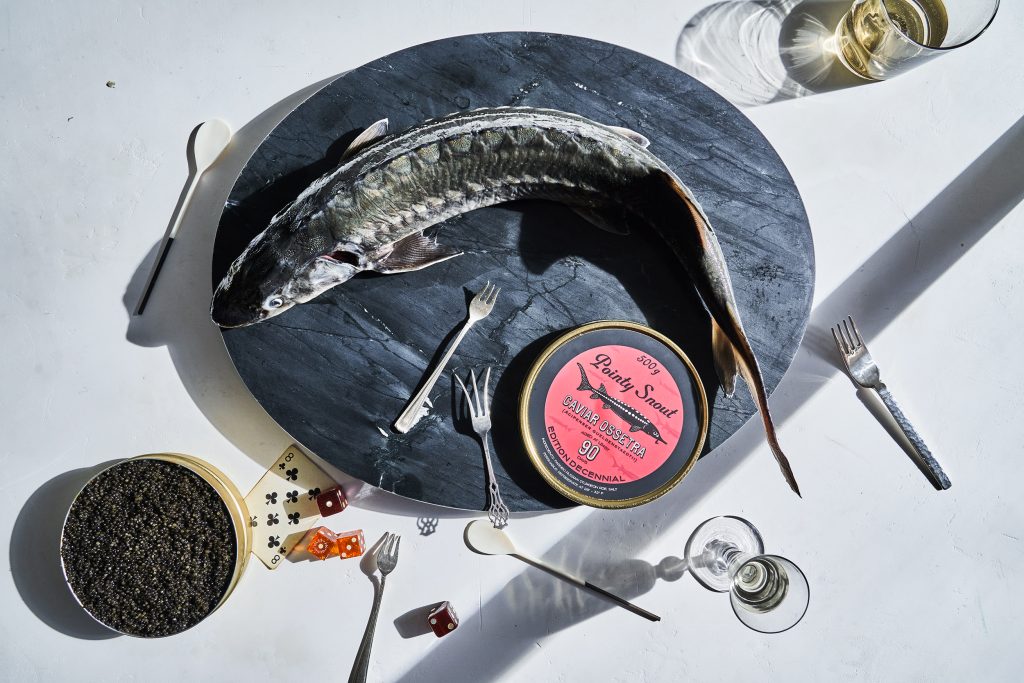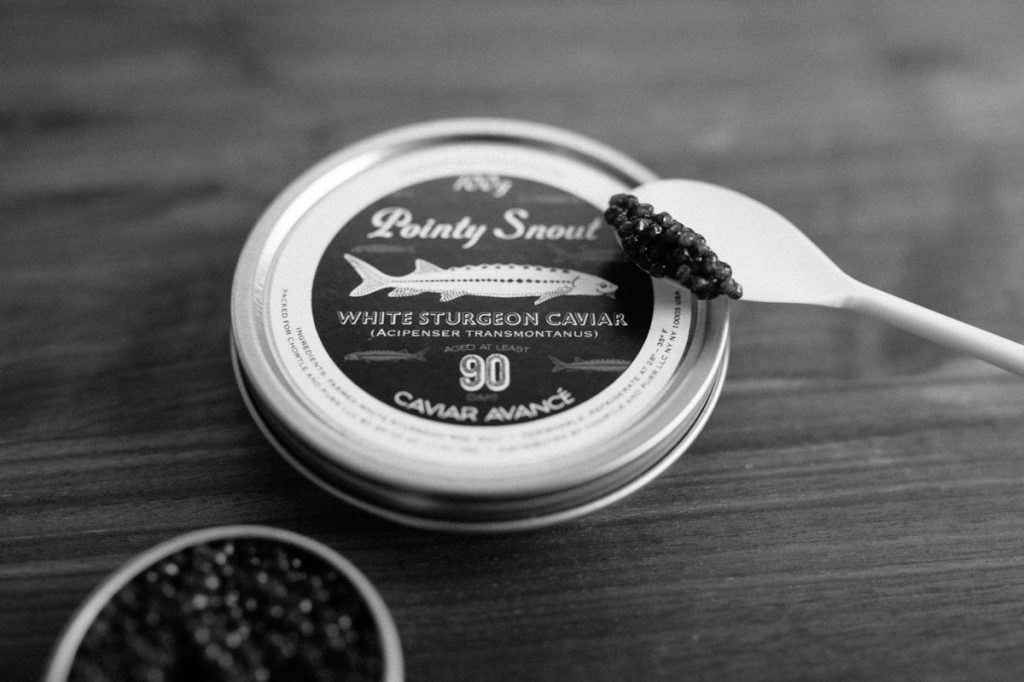Touring the Hudson Valley Headquarters of Pointy Snout Caviar
A former cafe, paused in time, houses the sustainable caviar brand

Compelling design, a pioneering position on sustainability and an undeniably delicious product led us to Pointy Snout Caviar in December 2014—when we first interviewed co-founders Alex Du Cane and Michael Kline. In November 2021, we ventured into the Hudson Valley on a moody, rain-swept day to revisit the brand at its home within the walls of a former cafe. The daily sandwich specials were still scrawled on a chalkboard and an impressive espresso machine still sat on a countertop. It was a scene paused in time, except for the lively duo that is Du Cane and Kline, and dozens of caviar tins in various sizes. Behind one wall, we’d soon learn, that delicacy was stored, weighed and packaged.

To understand how the couple arrived in the cafe, one must step back to the enchanted, unexpected beginning of the brand. “We did not grow up to be caviar impresarios or fishmongers. We had no experience in this category or in consumer products or marketing. I was an investment banker,” Kline tells us. “And I was an agent for fashion photographers,” Du Cane adds.
“Thirty years ago we met and married in four days,” Kline continues. “Alex had a fleet of animals—dogs, cats, three chinchillas, canaries, nightingales. She lived in New York. I had just moved from New York to California. I was going to be a partner in a new media company. My partner and I came back to New York to try to raise money for the venture. I met Alex for dinner the second night I was here. Soon after, we were married.” The couple began to ruminate on where home would be—and in the interim, they moved into The Stanhope Hotel on Fifth Avenue. They ended up living there for three years with their entire menagerie.

During their first 20 years together, they traveled around the world. They also launched several businesses and worked as collaborators. A little more than 10 years ago, they found themselves returning to the island of Lamu, Kenya. “That’s where Pointy Snout was born,” Du Cane says. They were sitting on the sand, eating straight from a caviar tin with gelato spoons, and began to consider the rest of their lives. “We wanted to engage a new category, a different division of luxury—and we saw the importance of being sustainable at the same time,” Kline says.

Kline and Du Cane took a year to visit every major sturgeon farm around the world to learn the business. In contrast, the identity of the brand—from its attention-grabbing design to the tins, labels and other elements—was imagined and finalized in five weeks. “We launched with a new attitude toward caviar. Everybody’s welcome. It shouldn’t scare you or be a once-a-year deal with your grandmother. It’s not cheap, because it’s expensive to raise. It takes between seven and 15 years to raise a sturgeon,” Kline continues. Soon after their launch, they partnered with the Experimental Cocktail Club and later became the house caviar at Chandon in the Napa Valley.

“We were completely opposite the traditional Czarist identity of brands in our category,” Du Cane says. “We were also saying, ‘Respect the fish.’ Nobody else was saying, ‘Respect the fish,'” Kline adds. “Sturgeon have been on the planet for 250 million years. In the space of the last 25 to 30 years, humans have managed to decimate so much of the wild population through pollution and poaching,” Du Cane continues. “As a result of that, farmers started sturgeon aquafarms. The first one was in California. Some of these farmers began working with scientists and learned how to produce superb caviar. Now, 99.9% of the caviar around the world is from sturgeon aquafarms.” Many of these farms also repopulate wild habitats.

Long before the brand moved from Long Island City to the Hudson Valley, the couple left NYC for Litchfield County, Connecticut. “We ended up staying in Connecticut full time, even though our brand was very New York-centric. All of our deliveries were there. We were doing two, three or four day trips per week.” Three years ago, however, “It finally dawned on us to import directly here, control our operations and pack ourselves. We started by buying 50 kilos of premium caviar from South America. We had no idea where we were going to put it.”
“It was arriving in three days, so I asked around,” Du Cane says. “Someone said you should speak to the head of dining at Hotchkiss [a boarding school in Connecticut]. We did. He had a catering kitchen that they did not use and he said he could assist in packing. But, he did not have a walk-in freezer. I spoke to Annie, the owner of The White Hart Inn. She had an extra walk-in cooler that she didn’t use. We ended up doing this for a year and a half.” Then the pandemic began.

The cafe they found in nearby New York State had closed three years ago. The space was for sale. The owner couldn’t find a buyer—or an occupant. He told the Pointy Snout founders that they could rent it and they moved in quickly. “That’s why it still looks like a cafe. Our operation is behind the door. We have nothing to do in the front except paperwork and meetings,” Kline explains.
In shoe-covering sterile booties, we pass into their processing center. Defined by meticulous organization, the minimal, pristine environment places cleanliness and efficiency at the forefront. It’s here that Du Cane demonstrates how a tin is packed and sealed. Shortly thereafter, we sit for a tasting of their various caviar types. Pointy Snout sources from around the world, be that Siberia, Israel, the US and elsewhere. Each comes with a distinct size, texture and flavor, though in all of them the quality is evident. Du Cane insists that spoons composed of wood or bone are to be used, or even plastic, but never metal—it influences the taste far too much. Of course, she also recommends that people dine straight from the tin, which, after our experience, we recommend too.
To celebrate their 10th anniversary, Pointy Snout introduced a luxuriant Edition Decennial gift box. Their caviar can also be purchased as tasting trios or in individually tins.
Images courtesy of Gentl + Hyers












